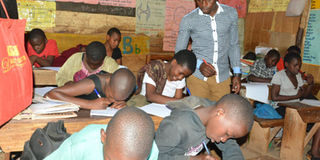Do all you can to educate your child for a bright future

Access to education is a fundamental right to children. PHOTO BY ESTHER OLUKA
Abia, 14, is a pupil at St Luke Lomodoch Primary School, Lolelia Sub-county, Kaabong District in Karamoja sub-region.
Abia is the youngest of three children in their family. Also, she is the only one among her siblings embarking on studies.
“I have two older brothers who refused to go to school. They say it is a wastage of time. They prefer looking after cows,” the youngster says.
Abia refused to follow in her brothers’ footsteps.
“I don’t like staying home, being idle. I want to study and become a nurse so that I can treat people,” she says.
Abia and her two brothers were single-handedly raised by their mother.
“My mother is supportive of my studies. She is often encouraging me to work very hard so that I can become someone important in society,” she says.
On May 30, a number of stakeholders, including local and government leaders, converged at Kaabong Secondary School grounds in Kaabong District for the launch of the Karamoja Education Declaration.
On this particular day, Rosemary Nansubuga Seninde, the State minister for Primary Education, emphasised during her speech that children would not develop if they were not taken to school.
“When you are a child, you never feel the pain of not going to school. The pain surfaces when you have grown up and see your agemates succeeding, leaving you behind because you lack the required academic papers,” Seninde stated at the time.
She encouraged parents to ensure their children go to school to avoid future regrets.
Where do we stand as a country?
At a media round-table held on November 20 at the United Nations Children’s Fund (Unicef) offices in Kampala, Brechtje Van Lith, the country director Save the Children in Uganda, emphasised the need for investing in education for children.
“Education is a foundation and building block of allowing children to know about, participate and implement their rights,” Lith stated at the event, adding: “Without education, children will not thrive or develop.”
Undeniably, the introduction of Universal Primary Education (UPE) in Uganda in 1997 has improved access to education, but, not the quality.
“For example, if you compared Kampala and Karamoja, the education there (in Karamoja) is still bleak with the quality of education still lagging behind. Teachers are not prepared enough, there are too many children in classrooms and the learning levels are still low,” Lith added.
For such reasons, she emphasised the need for the country to continuously invest in education of children. A 2018 United Nations Population Fund (UNPF) report titled ‘Population Matters: Leaving no one behind in Karamoja’, notes that the overall literacy rate for Karamoja stands at 25 per cent while in Kampala it is at 94 per cent. More than 70 per cent of the population older than 10 years in Karamoja has never been to school, of whom the majority are women.
On the other hand, at the same media dialogue, Mondo Kyateka, the assistant commissioner for Youth and Children at the Ministry of Gender, Labour and Social Development, said the country was still facing a big challenge in the education sector despite three decades of implementing the United Nations Convention on the Rights of the Child.
“We are doing fairly well with 95 per cent enrolment, but retention, especially progressing through primary seven, is a mere 28 per cent,” Kyateka stated.
Children drop out of school for different reasons, including poverty, grappling with the issue of menstrual pain and lack of sanitary pads for girls, and negative attitude from parents towards education, among other reasons. Despite these issues, parents have to find a way of ensuring that their children get quality education.
Children have a responsibility too
Dr Doreen Mulenga, the Unicef representative in Uganda says although we need to have the best interests of children at heart, we should accept that fighting for these rights comes with responsibility.
“So, as children, yes you have rights but also, you have responsibilities too. If your government is providing access to education, make sure you make use of it. Go to school with the full intention of making use of that education,” she says.
That way, both parties will be playing a fundamental role in ensuring that every child is getting access to an education.
But also, Cynthia Martha Nakangu, 16, who has just completed Senior Four examinations from Trinity Senior Academy, says government should emphasise more on implementing girl education initiatives so that more girls are supported to study and have equal chances in life like boys.
Why the emphasis?
Access to education is still a challenge for girls due to different reasons. Girls are still being married off at a young age, are sexually harassed in school and also they lack sanitary pads to deal with their menstruation cycles.
In a school like Lomodoch Primary School, records show that in first term, 804 boys enrolled and the girls were only 335. One of the teachers said it was because a number of the girls were being married off at an early age and also, a number of parents were not welcoming the idea of educating girls.
It’s for some of these reasons that organisations like Unicef emphasise enrolling and keeping girls in school so that they too can have a voice in their respective communities.
This story was published in
collaboration with Unicef




